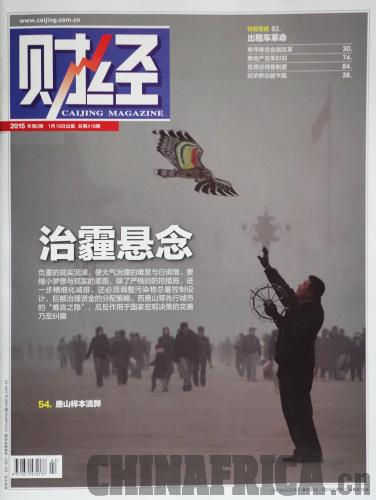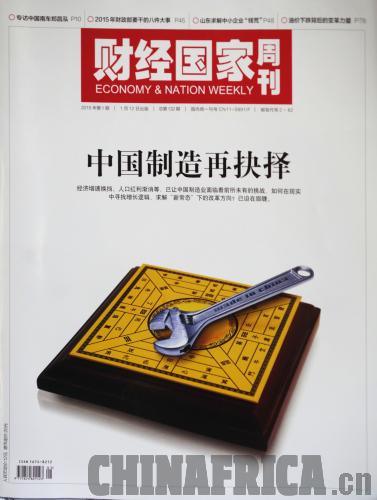| 
Meeting Smog Control Goal
Caijing
January 19
The Beijing Municipal Environmental Protection Bureau published the city's 2014 air pollution control results on January 4. The results show the volume of PM2.5 (airborne particles smaller than 2.5 microns in diameter) declined by 4 percent. The number of days recording heavy pollution dropped by 13 year on year.
However, it still fell short of the 5-percent decrease rate target laid out in its Clean Air Action Plan 2013-17. Caijing claims that if the current rate is projected onto the next three years, the target of reducing PM2.5 by 25 percent by 2017 against 2012 levels becomes unattainable.
Severe air pollution in China has pushed the government to launch a war on smog. In recent years, measures such as cutting down on coal use have been implemented across the country. Capital city Beijing has taken the most forceful measures including restrictions on car purchase and relocating heavily pollutant factories out of the city. Despite all this, however, Beijing still failed to meet its goal. The magazine warns that the difficulties and pressures lying ahead will be of an unprecedented magnitude.

New Crossroads
Economy & Nation Weekly
January 12
The manufacturing industry has been the engine of global economic growth since the 18th and 19th centuries. Growth in this sector has been a major determinant of the economic competitiveness of all countries. China has achieved tremendous growth since reform and opening up in the late 1970s. Yet, China's manufacturing sector has now come to a new crossroads and faces a lot of challenges.
The Economy & Nation Weekly examines the current situation in China's manufacturing sector, its challenges, and the strategies to upgrade this sector. The pressing problems include the slowdown in economic growth, a fading demographic dividend and rising production costs. The manufacturing industry's profitability and the contribution it makes to the country's economy have continued to slide. In this context, China's crucial task is facilitating and nurturing innovation in its manufacturing industry.
The magazine suggests the country make itself stronger through a powerful manufacturing industry. It is faced with urgent tasks such as making use of the momentum generated by innovation and creating new advantages for its manufacturing industry. Relying on innovation to upgrade the traditional economic structure is the most feasible way.

Healing Cancer Patients' Psychological Wounds
Oriental Outlook
February 5
The World Cancer Report 2014 released by the World Health Organization reveals that the number of cancer patients and cancer deaths worldwide increased in 2012. China topped the world that year in terms of the number of cancer-related deaths and new cancer cases, mainly owing to its large population base.
The focus of cancer patients, their families and even doctors in China has been on tackling the disease itself, with inadequate attention paid to patients' psychological well-being. The Oriental Outlook magazine looks at the psychological problems of cancer patients in China as well as the measures taken to heal their psychological wounds.
Many patients suffer side effects such as hair loss from treatment, often feel ashamed, and are looked down upon by others. Some survivors find it difficult to land a job owing to their medical history. All relevant parties, such as hospitals, psychological counseling centers and non-government organizations, should make efforts to resolve these issues.
The Shanghai Cancer Center of Fudan University has set an example in this respect. The hospital has established a team of psychiatrists to offer consultations to patients both on the phone and face to face. Every new patient will receive guidance as to how to face cancer. However, the article argues that more needs to be done nationwide to facilitate the re-assimilation of estranged patients and survivors into society and help them become confident and find meaning in their lives.
Women Face Job Bias
Global Times
February 7
A report by the National Academy of Development and Strategy, Renmin University of China, has underscored gender discrimination by employers in China, saying male graduates are 42 percent more likely to be called to a job interview than females, even if the resumes are identical.
Although China has been promoting employment equality, discrimination is pervasive and still widely practiced by both private companies and government institutions. Job advertisements asking only men to apply are illegal but common.
A fresh college graduate took a Beijing-based company providing private tutors to court and won China's first gender-based employment discrimination case in late 2013 after the company refused to employ her because of her gender. Recently, another woman took Beijing Postal Express and Logistics Co. Ltd. to court for the same reason. However, not every woman who faces prejudice in job hunting is as brave. There is still a long way to go to ensure employment equality. |